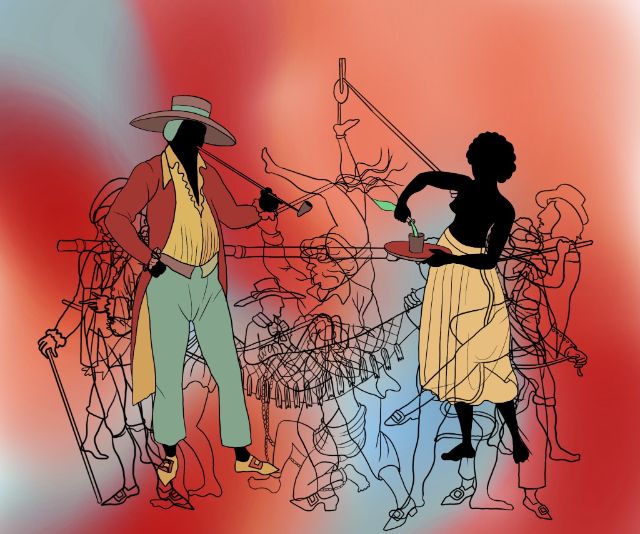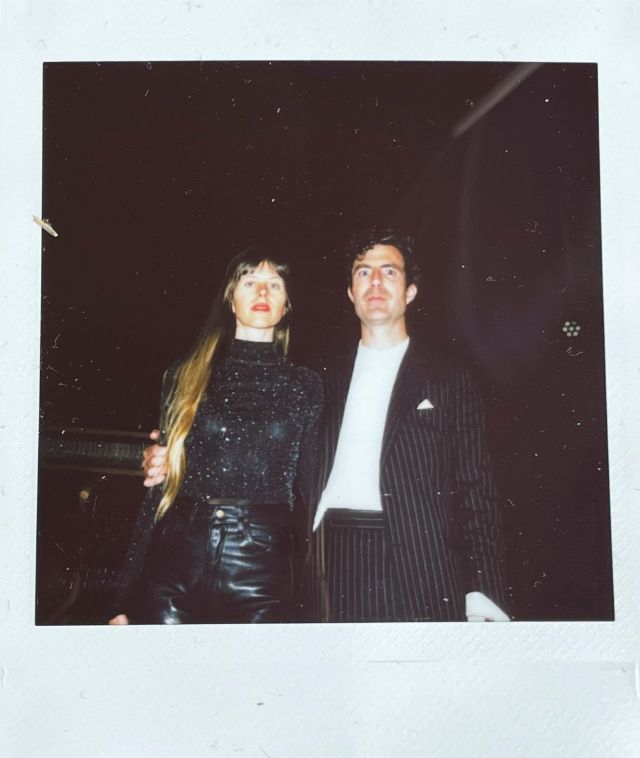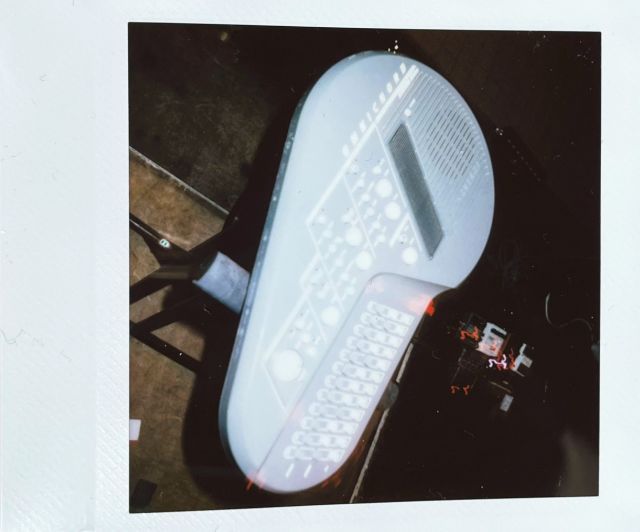Schwarz/Weiss 2023
Schwarz/Weiss ist das Radio X-Format, welches sich mit den Beziehungen Basels mit Afrika auseinandersetzt. Die sechste Ausgabe widmet sich der Basler Kolonialgeschichte, der Basler Rolle im Sklavenhandel und den aktuellen Diskursen zu Restitution und Wiedergutmachung. Ein breit aufgestelltes Team – unter ihnen der Musiker Manuel Gagneux und eine grosse Zahl von Gästen ermöglicht die hintergründige Sendereihe, welche auch als Podcast angeboten wird. Start ist am 11. März.
“Stadt der Profiteure“ titelte unlängst das deutsche Magazin Geo – und meinte damit Basel, welches als Handelsstadt einen Teil seines Reichtums dem aktiven Mittun im Sklavenhandel verdankt. Davon zeugen die herrschaftlichen Sitze hoch über dem Rhein, die heute, wie das Blaue Haus, der Verwaltung dienen. Doch gibt es nicht nur steinerne Zeugen, sondern auch Nachkommen jener Familien. Zu ihnen gehört u.a. Leonhardt Burckhardt, Basler Politiker und Professor an der Universität, der auf Radio X sehr persönlich Auskunft über diese Erbschaft gibt.
Ganz unterschiedliche Familiengeschichten und damit ganz unterschiedliche Sichtweisen bringen die Basler Autoren Martin R. Dean und Nicolas Ryhiner mit ihren Werken „Meine Väter“ und „Im Surinam“ zum Ausdruck; sie treffen in einem Gespräch aufeinander.
Zum Stand der Geschichtsforschung geben die Historiker:innen Susanna Burghartz und André Salvisberg von Stadt.Geschichte.Basel Auskunft. Weitere Ausgaben von Schwarz/Weiss – Basler Kolonialgeschichte beschäftigen sich mit den Sammlungen der Basler Museen, der Qualität der aktuellen Wirtschaftsbeziehungen mit Afrika, und dem Blick, der von dort auf Basel geworfen wird.

Sendungen vom 11. März bis 3. Juni 2023
Die Schwarz/Weiss-Sendungen sind in folgende Schwerpunkte unterteilt:
1. Auftakt-Sendung: HörboX am 11. März (Wiederholung am 12. März)
2. Familiengeschichten mit kolonialem Hintergrund: Beitrag am 16. März
3. Der Basler Sklavenhandel: Beitrag am 23. März
4. Was findet sich in den Archiven?: Beitrag am 30. März
5. Gespräche mit Basler Familien: Beitrag am 6. April
6. Sammlungsprovenienzen & Benin Initiative Schweiz: Beitrag am 13. April
7. Heutige kulturelle Blicke und Austausch: Beitrag am 27. April
8. Rolle der Basler Mission: Beitrag am 4. Mai
9. Basels Handel heute: Beitrag am 11. Mai
10. Der Blick von Afrika auf Basel: Beitrag am 18. Mai
11. Brennpunkte und Forderungen der Gegenwart: Beitrag am 25. Mai
12. Schlussveranstaltung: HörboX am 3. Juni (Wiederholung am 4. Juni)

Projektteam, Kooperationen und finanzielle Unterstützung
Seitens Radio X sind Thomas Jenny, Danielle Bürgin, Janina Labhardt, Claire Micallef, Michaela Liechti, Mirco Kämpf und Paul von Rosen als Redaktionsteam unterwegs. Moderatorin ist Elisa Da Costa, Master-Studentin African Studies.
Das Artwork besorgte die Basler Künstlerin Sade Titilayo Hannah Fink, die Textildesign und Modedesign im Bachelor an der FHNW/HGK in Basel abschloss und nun Kunst & Vermittlung studiert.
Das Soundlayout zur Sendereihe wurde von Musiker Manuel Gagneux komponiert, dessen international gefeierte Band Zeal & Ardor das Thema musikalisch spiegelt.
Mit der freundlichen Unterstützung der Bürgergemeinde der Stadt Basel und der eidgenössischen Fachstelle für Rassismusbekämpfung.

Lael Neale: "Maybe the museums should burn"
A brief interview with American chanteuse Lael Neale on the beauty (& ugliness) of personal experience composed in a universal language, all on the trails of her very own, dead poet society. Some thoughts recorded after attending her gig at DOKA, Amsterdam on a Monday night 19th of may 2025. von Mirco Kaempf
Lael Neale at DOKA, Amsterdam (19th may 2025)
Ein Interview mit der Amerikanischen Liedermacherin Lael Neale, aufgezeichnet im Backstageraum des Volkshotels (Doka) in Amsterdam.
Backstage at Doka, Amsterdam – May 19, 2025
Interviewer: Mirco, you can read another portrait here
You're currently touring your album Altogether Stranger through Europe. With such a busy schedule, I wonder—do you feel more like an alien or a human right now?
Lael Neale: Definitely more like an alien.
You wrote that Altogether Stranger was born from the sensation of returning from rural Virginia to Los Angeles. That contrast—neon lights, noise—made you feel out of place. Now that you’re touring Europe, do the songs feel different here?
That's a great question. I think alienation is everywhere now because of globalization. Driving into Amsterdam, we passed old windmills and then suddenly saw the golden arches of McDonald's. I love Europe—I see it as a place of high art and beauty—but modernity is spreading everywhere. The songs feel universal in that sense. I can feel alienated no matter where I go.
Your songs seem to help people refocus—like walking into a museum. Is that hard for you to maintain, that level of awareness?
Honestly, it's harder for me to lose focus. Being hyper-aware of everything isn't always healthy. There's value in critical thinking, but it can also suffocate you. I try to balance observation and judgment with simply breathing and accepting that there's beauty and ugliness in the world—and sometimes things are just... neutral.
So, would you say music helps you escape, or is it a way to hyper-focus?
Definitely hyper-focus.
The sound on this album has evolved—less centered on the Omnichord and more textured. What role does the Omnichord still play?
It's still my main songwriting tool. Most songs start there. Some were written on guitar or piano, but the Omnichord remains central. The fuller sound on this record is thanks to Guy Blakeslee, who added more arrangements and textures.
The sound has this sharp, compressed quality. Why go for something so raw and edgy instead of more polished?
We consciously chose that sound. We cut a lot of the low end to make the vocals sharp—like a knife. When our mastering engineer, Chris Coady, started softening things, we were like, “No—make it even sharper!” Eventually, he embraced it too. The sound is very intentional.
Would a digital recording by a betrayal to your sound?
We recorded the last two albums on cassette machines for the texture and limitations. For Altogether Stranger, we tried tape again, but the machine kept going out of pitch—it was unusable. We switched to digital, which was hard philosophically, but we recorded everything quickly, in one or two weeks. It still feels raw and alive, and we approached it with the same intention as with tape.
Some lyrics touch on environmental themes—plastic in the ocean, for example. Has your music become more political?
I don’t see environmentalism as political. I want nothing to do with politics—it’s ruining everything. Taking care of the Earth and each other is just common sense. It’s been politicized, which creates unnecessary division. People may agree fundamentally, but the way it’s discussed creates conflict.
That makes me think of your songs as paintings hung in a burning museum—are they there to put the fire out?
Maybe the museums should burn. Maybe we should paint directly on the walls of old buildings. Museums might be over.
Last question: Do you believe in the goodness of human nature?
Yes, I do.
Thank you so much.








.png/jcr:content/magnolia-medium.png)

